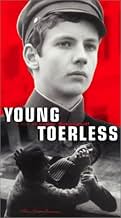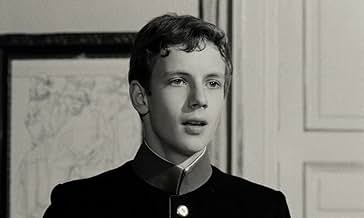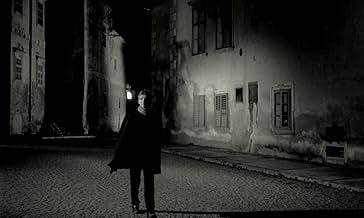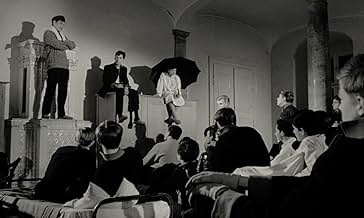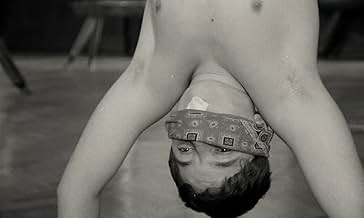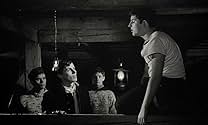IMDb-BEWERTUNG
7,2/10
2818
IHRE BEWERTUNG
Füge eine Handlung in deiner Sprache hinzuIn a boarding school, a student observes in passive disgust as his two friends manipulate, humiliate and torture a fellow student, justifying their every act.In a boarding school, a student observes in passive disgust as his two friends manipulate, humiliate and torture a fellow student, justifying their every act.In a boarding school, a student observes in passive disgust as his two friends manipulate, humiliate and torture a fellow student, justifying their every act.
- Regie
- Drehbuch
- Hauptbesetzung
- Auszeichnungen
- 4 Gewinne & 1 Nominierung insgesamt
Empfohlene Bewertungen
What's interesting about this film is the way it unapologetically removes the true and original gay content from the story. Torless has a passionate gay affair in the original. In the film gayness is alluded too as perhaps a contributing factor to the corruption of innocents via the pursuit & discovery of knowledge & experience. As a gay person with a broad understanding of the systematic exclusion and removal of gay people from history, the main theme of the film, re: the brutality , sadism and masochism & manifestation of fascism is somehow deeply compromised by the idea that it is excusable, if not absolutely impossible to reveal Torless's gay self as a positive and actual fact of his boyhood because it would offend European bourgeoisie taste of the 60s. So the sensationalism of fascism is portrayed and the recent anti-Semitic WW11 history of Austria 'allowed' as an allusion to it's part in Nazi history, but homosexuality is still being demonised and censored in a film which purports to be about anti-fascism. I don't buy that - and we've all been robbed of the true story - where Torless , far from being a dried up , cold 'acceptably' moral and suggestively straight prude, in the real story embraces the presence of gay feelings rampant in the original story and which contribute to the whole process of his crisis about morality which the film hijacks to portray a censored and acceptable message of it's own.
people should not be distracted about the specifics of the plot,or the tangential,secondary themes of cruelty/sexuality..schlondorf has made his metaphor clear and passionate..people in positions of power(due to talent,wealth,titles of authority,physical stregnth,etc)are not entitled to abuse others,no matter what their alleged justification;and people who witness such abuses and do nothing are worse than enablers, they are accomplices..the obvious association is with the Nazis,but this is a universal problem that could be likened to the Spanish inquisition,the salem witch trials,the torture of prisoners during the iraq war,the red scare hearings and countless others..my own feel is that torless is held up as someone who contributes mightily to this particular evil,but fools himself into thinking he's not involved..his final speech was a lame attempt to justify his conduct..the film may not have been entertaining,but it was thought-provoking
1. It's been said here that the gay content of the story has been removed. Well, the novel was released in 1905. We can nowadays interpret elements of the story in a gay context, but back then these notions did not exist. If Schlöndorff hints at homosexuality as an element of perversion, that is in fact faithful to the novel, which takes a strictly observatory, non-participating stance.
2. 'Törless' is often interpreted as an indicator of upcoming intolerance and Nazidom. Again, the novel was released at a much too early time to allow for such an interpretation; the novel's author Robert Musil certainly envisioned the inevitable fall of an empire stuck to tradition and incapable of accommodating personal liberties. Schlöndorff pushes some of the juvenile delinquents into similarities with the Nazis - albeit being carefully ambiguous about it -, but it would be wrong to consider this interpretation as a part of the original narrative.
3. 'Törless' is a highly psychological tale and film - again, Schlöndorff proves faithful to the novel in this respect. But this comes with the weakness of constructing characters around a certain social concept. It would be misleading to consider Törless and his rebellious friends as typical representatives of their era, or real figures upon which the author based his characters. As may be more obvious in Musil's masterpiece, 'The Man without Qualities', his characters are crafted to evoke rather a situation than a person; that makes his books almost impossible to adapt correctly.
Schlöndorff's film is somewhat middlebrow; it does not intend to be a substitute for reading the novel, but at the same time it carefully avoids to give the impression that it is anything but a rendition of it. That's not quite true; the interpretation is in the framing, the omissions of the subtext, and that the ideas upon watching the film differ considerably from those you get when you read the novel. One may call it therefore a failure - but an interesting failure to watch.
2. 'Törless' is often interpreted as an indicator of upcoming intolerance and Nazidom. Again, the novel was released at a much too early time to allow for such an interpretation; the novel's author Robert Musil certainly envisioned the inevitable fall of an empire stuck to tradition and incapable of accommodating personal liberties. Schlöndorff pushes some of the juvenile delinquents into similarities with the Nazis - albeit being carefully ambiguous about it -, but it would be wrong to consider this interpretation as a part of the original narrative.
3. 'Törless' is a highly psychological tale and film - again, Schlöndorff proves faithful to the novel in this respect. But this comes with the weakness of constructing characters around a certain social concept. It would be misleading to consider Törless and his rebellious friends as typical representatives of their era, or real figures upon which the author based his characters. As may be more obvious in Musil's masterpiece, 'The Man without Qualities', his characters are crafted to evoke rather a situation than a person; that makes his books almost impossible to adapt correctly.
Schlöndorff's film is somewhat middlebrow; it does not intend to be a substitute for reading the novel, but at the same time it carefully avoids to give the impression that it is anything but a rendition of it. That's not quite true; the interpretation is in the framing, the omissions of the subtext, and that the ideas upon watching the film differ considerably from those you get when you read the novel. One may call it therefore a failure - but an interesting failure to watch.
The movie won an award at the Cannes Film Festival when it was first released and signaled the beginning of a German cinematic revival. The book was written in 1906 and is a tedious read, although thankfully a short book. Homosexuality plays a large role in the book but virtually does not exist in the movie. Torless, a horny teenager in an all boys school, eventually has a torrid sexual affair with one of the students. The movie chooses to ignore this, and maybe for good reason as it was released in I believe in 1966. Filmed in black and white, the lack of color contributes to the atmosphere of German austerity that director uses to his advantage. The final speech by Torless is a brilliant defense for the lack of opposition by the middle class to the rise of Hitler. Most of the teenagers in the movie were not aspiring actors but were chosen almost at random for their roles. But considering the time in which it was produced this is a land mark film, especially for German cinema. The movie is much more entertaining than the book and the director,Volker Schlondorff, did a fabulous job and deserves the awards it was given.
Volker Schlondorff has been acclaimed by critics for such films as 'The Tin Drum', 'The Lost Honour of Katherina Blum', and 'Coup de Grace'; all of them films based on fine novels by Gunter Grass, Heinrich Boll and Marguerite Yourcenar respectively, and yet forerunner though he was to the German New Wave Cinema has never been quite given the same acclaim as Wim Wenders, Werner Herzog and Rainer Werner Fassbinder, and I wonder if it is because he films (excellently) from literary sources. His films have a cold look and an enquiring one and 'Young Torless' based on Robert Musil's novel 'The Confusions of Master Young Torless' is one of his best adaptations. The book is as coldly written as the film, and Schlondorff does it justice by using an austere black and white photography, but has as soundtrack Hans Werner Henze's fine if equally emotionless score. Sadly in the current climate of cinema most of these names will seem unknown, lost in the mists of the latter part of the 20th Century. As so many reviewers have given away the plot I will not give in to too many spoilers other than to say it is set on the Austrian-Hungarian border land in an Academy for young male students. In 1906 when it was published there was no such conception of Nazism as we know it, nor was there much in print on sadistic, murderous homosexual torture. Even in 1966 it was brave to put this on film and so unsparingly, and his choice of cast was well chosen. Mathieu Carriere plays the lead role as the 'watcher' and sometimes participator of these perverse pleasures taken by two other students as well as him, and most of the time he looks piously on, studying evil more than opposing it and becomes the worst of all of them as he condones by reason what he sees before him. He is in a way a coward, and unlike the other two admirably played by Bernd Tisch and Fred Diets he hypocritically shows less sexual and sadistic pleasure. I regret that the homosexuality was only obliquely shown, but given the nature of the subject in 1966 it was 'normal' to withdraw the camera for what would have been unacceptable viewing, and only the brutality of the sadism is sickening and fully shown. I give it a 10 for its brilliant attempt to tackle the Musil book and there is a certain failure in the director's approach by him being too cautious, but all the same it succeeds on so many levels that I feel it deserves a 10. It was unique then, and should not be as forgotten as it is now, and was in its way also a forerunner of openly homosexual subject matter. Its political aspects are made too much of as in my opinion it shows the savagery of men hidden away behind polite surfaces; a subject matter as controversial as it is still, and I am thinking of the recent film 'Goat' dealing with hazing in modern Academic schools which has equally been given less distribution than it should have been.
Wusstest du schon
- WissenswertesLuchino Visconti had previously tried to set up a version of " Young Torless " with Romy Schneider starring.
- Zitate
Thomas Törless: Yet another day to tell our grandchildren about.
- VerbindungenFeatured in Film Review: International Films (1968)
Top-Auswahl
Melde dich zum Bewerten an und greife auf die Watchlist für personalisierte Empfehlungen zu.
- How long is Young Törless?Powered by Alexa
Details
- Erscheinungsdatum
- Herkunftsländer
- Sprache
- Auch bekannt als
- Young Törless
- Drehorte
- Eggenberg Palace, Graz, Styria, Österreich(military school)
- Produktionsfirmen
- Weitere beteiligte Unternehmen bei IMDbPro anzeigen
- Laufzeit
- 1 Std. 27 Min.(87 min)
- Farbe
- Sound-Mix
- Seitenverhältnis
- 1.66 : 1
Zu dieser Seite beitragen
Bearbeitung vorschlagen oder fehlenden Inhalt hinzufügen

